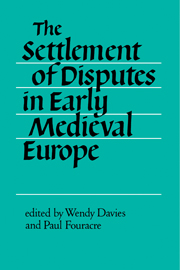Book contents
- Frontmatter
- Contents
- List of figures
- Preface
- Abbreviations
- Introduction
- 1 Disputes in late fifth- and sixth-century Gaul: some problems
- 2 ‘Placita’ and the settlement of disputes in later Merovingian Francia
- 3 Dispute settlement in Carolingian West Francia
- 4 People and places in dispute in ninth-century Brittany
- 5 Visigothic law and regional custom in disputes in early medieval Spain
- 6 Land disputes and their social framework in Lombard–Carolingian Italy, 700–900
- 7 Dispute settlement in the Byzantine provinces in the tenth century
- 8 Charters, law and the settlement of disputes in Anglo-Saxon England
- 9 Dispute settlement in medieval Ireland: a preliminary inquiry
- 10 An early modern postscript: the Sandlaw dispute, 1546
- Conclusion
- Appendix texts of the documents discussed
- Glossary
- List of works cited
- Index
7 - Dispute settlement in the Byzantine provinces in the tenth century
Published online by Cambridge University Press: 11 January 2010
- Frontmatter
- Contents
- List of figures
- Preface
- Abbreviations
- Introduction
- 1 Disputes in late fifth- and sixth-century Gaul: some problems
- 2 ‘Placita’ and the settlement of disputes in later Merovingian Francia
- 3 Dispute settlement in Carolingian West Francia
- 4 People and places in dispute in ninth-century Brittany
- 5 Visigothic law and regional custom in disputes in early medieval Spain
- 6 Land disputes and their social framework in Lombard–Carolingian Italy, 700–900
- 7 Dispute settlement in the Byzantine provinces in the tenth century
- 8 Charters, law and the settlement of disputes in Anglo-Saxon England
- 9 Dispute settlement in medieval Ireland: a preliminary inquiry
- 10 An early modern postscript: the Sandlaw dispute, 1546
- Conclusion
- Appendix texts of the documents discussed
- Glossary
- List of works cited
- Index
Summary
It is an irony of history that so few administrative documents have survived from Byzantium, one of the most bureaucratic states of the medieval world. We know from existing documents that instructions were given to file duplicate or even triplicate copies in the offices of governmental bureaux, yet most of these originals have disappeared without trace. We possess only those documents of concern to the monastic houses which survived the onslaughts of westerners and Turks (such as the protected houses on Mount Athos) or those which found their way into ecclesiastical archives, such as the southern Italian documents to be discussed later. Everything else, including the entire imperial and governmental archives of Constantinople and the provinces has, with very minor exceptions, been lost.
But whilst much of the documentary flesh has decayed, the administrative skeleton of the middle Byzantine state has been successfully reconstructed and its guiding principles of centralization, order (taxis) and secularity established. Such principles were, in their turn, derived from two pervasive influences in Byzantine society: tradition, and its practical aspect, precedent. These two criteria were most clearly expressed in the Byzantine legal system. It was descended from the tradition of Roman jurisprudence and legislation and, in theory, provided an all-embracing system of regulating criminal and civil justice. Custom certainly played a part in Byzantine legal activity, but it was a custom either long since subsumed into codified legislation or self-consciously referred to as an external element of which the law had to take account.
- Type
- Chapter
- Information
- The Settlement of Disputes in Early Medieval Europe , pp. 125 - 148Publisher: Cambridge University PressPrint publication year: 1986
- 3
- Cited by



